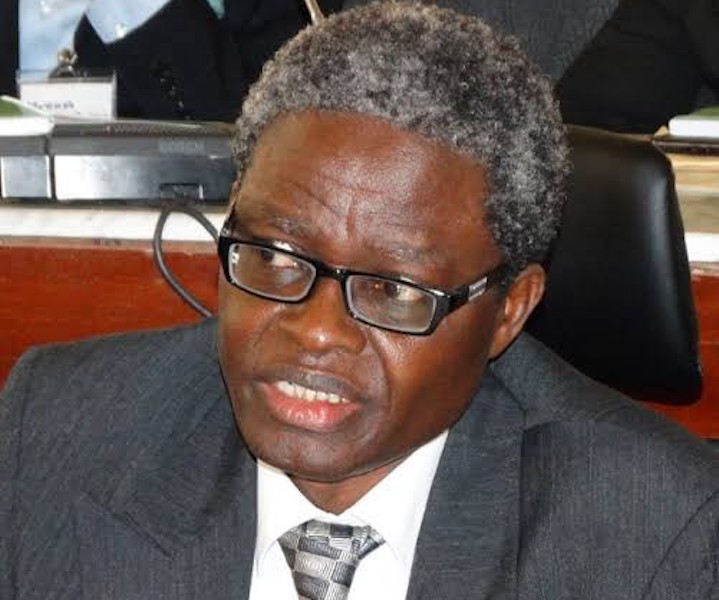4-Ds is the current foreign policy doctrine introduced by Ambassador Yusuf Maitama Tuggar, Minister of Foreign Affairs, under President Bola Ahmed Tinubu (PBAT), to re-define and re-project Nigeria’s international image in the comity of nations. It is a doctrine that encompasses the Akinwande Bolaji Akinyemi-introduced Consultation Doctrine in Nigeria’s foreign policy. The consultation doctrine requires that Nigeria be first consulted if Nigeria’s support is expected by another country in the event of crises and conflicts: Intrinsic in the required doctrine is self-reliance and self-ascribed capacity to help others.
As espoused by Foreign Minister Tuggar, the doctrine of 4-Ds is about Democracy, Development, Demography, and Diaspora. It is about people, their attitude and character. For instance, there is nothing like development without the people. Without the people, development is meaningless. The purpose of development is the people, their welfare, their well-being and quality of life. Demography is about the statistical growth of the people and their economic activities. Diaspora is also about people defined by factor of migration. In essence, the 4-Ds is another expression for human security and societal development.
D-BRIDGE is our own coinage from Diaspora-BRIDGE that was inaugurated on Monday, 28th July, 2025 by the Vice President, Kashim Shettima, and the Federal Minister of Education, Dr Maruf Olatunji Alausa, at the State House Banquet Hall in Abuja. BRIDGE is the acronym for ‘Bringing Research, Innovation, Development, and Global Engagement,’ to Nigeria in a globalising world of changing technology. While the doctrine of 4-Ds has an attitudinal character, BRIDGE is behavioural. It includes the translation of the 4-Ds as a value, vision and objective into manifestation. As such, there is complementarity between the 4-Ds and the D-BRIDGE. The 4-Ds reflects the aspect of diplomacy while the D-BRIDGE is the supportive implementation through scientific and educational creativity. The two do complement one another in Nigeria’s quest for strategic autonomy whose ultimate objective is a self-reliant new Nigeria.

4-Ds, D-BRIDGE and New Nigeria
As explained by the Federal Ministry of Education, D-BRIDGE is designed ‘at empowering research, innovation and global collaboration in Nigerian academia. D-BRIDGE will ensure that Nigerian academia benefits from global expertise, funding opportunities, industry linkages, and knowledge transfer.’ And perhaps more note worthily, ‘the programme creates structured pathways for Nigerian scholars abroad to engage meaningfully with institutions in Nigeria, bridging gaps in teaching, enhancing research capacity, teaching methodologies, and industry relevance.’
In doing this, the Federal Minister of Education, Dr Maruf Olatunji Alausa, himself a Diaspora returnee, has not only responded to how Government should relate with the Diaspora, but has also complemented the good work of the Nigerians in Diaspora Commission by establishing the D-BRIDGE, an electronic educational platform for interactive creativities between and among Nigerian academics at home and in the Diaspora. The D-BRIDGE initiative as noted above, was officially launched last week Monday, 28 July, 2025 at the Presidency, Abuja.
As the Education Minister put it, ‘through BRIDGE, we are launching a digital platform that allows for collaborative teaching mentorship, joint research, capacity-building and policy innovation – all driven by Diaspora and home-based professionals alike.’ Vice President Kashim Shettima, who was represented at the launch, noted that, ‘for too long, the collaboration between Nigerian-based professionals and our brothers and sisters in the Diaspora has been fragmented. Today, through BRIDGE, we are laying the foundation to repair that trust with intentionality, transparency, and inclusivity… What we lacked was system to harness their passion and expertise. That is what BRIDGE provides.’ This is good and enough a reason for continued government’s pledged support. This is also why we agree with the Minister of State for Education that the D-BRIDGE, as an initiative, marks a new chapter in how we view the Nigerian diaspora, no more simply as citizens living abroad, but more significantly ‘as strategic partners in nation-building. D-BRIDGE represents a structured, transparent, and accountable, framework that ensures our Diaspora professionals can engage in a meaningful, sustainable, and impactful way.’
Without whiff of doubt, nation-building is not only an objective of every sovereign State, but also an effort and a process that requires complementarity and continuity of development policies under an incumbent and successive governments. Nation-building is about the fostering of national identity, development of shared values and sense of belonging, political stability, and unifying a diverse population. This is why every country engages in nation-building. The neglect of any effort at nation-building has, more often than not, warranted development setbacks. Not having strong institutions cannot be helpful to nation-building. And true enough, corruption and weak governance cannot strengthen the development of strong institutions. On the contrary, it only erodes public trust.
In Nigeria, very little efforts are made to build a Nigerian nation. Various governments of Nigeria prefer to give national honours and flamboyant financial gifts to footballers for winning medals than fulfilling their contractual official obligations. The Nigerian government in 1994 afforded the luxury of collecting monies from Nigerians for the purposes of building and allocating houses for them. In 2025, no houses have been built. No houses have been allocated. Monies collected in 1994 have not been refunded. No information is given by the Government on the status of the building project. And most disturbingly, no subsequent government or administration has taken up the responsibility to address the problem. Yet, Government is preaching the sermons of patriotism and nation-building. There cannot be any good nation-building in the face of conscious pen robbery, political chicanery, institutional corruption which is what the subsequent Governments have always been engaged in. This is more criminally and worse than armed banditry and robbery. However, with the doctrine of 4-Ds and the D-BRIDGE put in place by different government ministries under President Bola Ahmed Tinubu (PBAT), it appears that the PBAT administration is adopting a new approach to political governance in Nigeria: coordination of development policies by various ministries.
Regarding sustainability of government policies, they are hardly sustained by successor governments. Every new government tries to introduce new ideas that often neglect previous efforts even if they are relevant. When there is no continuity and complementarity of purpose. it cannot but be quite difficult for Nigeria to develop beyond economic growth. The ideal thing to do when there is a good and new development policy in one government Ministry is to build on old policies, sustain them and make the new policies complementary to existing policy, especially if it is coming from another Ministry. And good enough, the launching of the D-BRIDGE is a good and relevant complement to the doctrine of the 4-Ds. This requires a special coordination by the Foreign Ministry and the Federal Ministry of Education. The Diaspora is a common factor in the 4-Ds and the D-BRIDGE.
Put differently, Nigeria under PBAT appears to be laying new foundations for a new Nigeria. The first foundation is the current effort to use foreign policy, particularly the external environment, to grow and develop Nigeria. In this regard, the particular case of the Doctrine of 4-Ds is noteworthy. In the eyes of Ambassador Tuggar, the doctrine of 4-Ds has the potential to leverage Nigeria’s big population, while focusing on development initiatives, engaging the Diaspora, and promoting democratic principles. The BRIDGE has complemented the quest to engage the Diaspora under the 4-Ds by creating implementation platforms. Like the 4-Ds recognises the indispensability of the Diaspora in national development, the BRIDGE has interestingly also provided a catalytic platform for the engagement of the Diaspora through research, teaching, learning, financial and intellectual remittances, advocacy and social capital.
Additionally, Nigeria’s demography or big population earns her respect in global politics as allocation of international privileges partly reckon with size of population, GDP, and territorial size. This is in spite of the principle of equality of sovereignty. For instance, there is the principle of ‘weighted voting’ which is about the extent of one’s financial contributions determining the number of votes in international economic relations. The Diaspora is undoubtedly a subset of the Nigerian population. Most of them are skilled individuals and professionals that have the great potential to add value to Nigeria’s development.
Development wise, Ambassador Tuggar believes that the Diaspora can be well- channelled into the infrastructure, healthcare and agriculture to boost national development. In the same vein, democracy underscores Nigerians in the Diaspora as possible good advocates for good governance and transparency, and by so doing, contributing to Nigeria’s political stability and prosperity.
Complementarity of Diplomacy and Educational Innovation
From the foregoing, there is no disputing the fact that there can be complementarity of diplomacy and educational creativity for the purposes of Nigeria’s quest for strategic autonomy. They can be rightly considered as constituting two sides of the same coin in the sense that the 4-Ds provides a framework for Diaspora engagement while the D-BRIDGE outlines the instruments through which the financial and intellectual resources of the Nigerians in Diaspora can be properly channelled. In other words, the 4-Ds is the policy framework while the D-BRIDGE is the electronic pathway to follow.
Explained differently, the D-BRIDGE as a platform involves the use of virtual seminar hosting, e-learning modules, collaboration tracking, a searchable directory of experts, as well as project life cycle monitoring. In other words, the D-BRIDGE has been designed to be a repository for scientific and diplomatic research. In this regard, the provision of a framework under the doctrine of 4-Ds and implementation mechanisms under the D-BRIDGE have the potential to accelerate Nigeria’s development agenda of economic growth, social progress, and democratic consolidation. This is an important positive development in the political governance of Nigeria.
First of all, evolving a collaborative framework between the 4-Ds and the D-BRIDGE has the potential to turn the current brain drain to brain gain, and therefore, to a development asset. Most Nigerians in the Diaspora have acquired a modicum of specialisation before leaving Nigeria for greener pastures abroad. They furthered their specialisation abroad by acquiring more expertise. It is the acquisition of this new expertise that is of much interest to the Government and Nigerian professionals at home. Their expertise is seen as a new asset to be added to the existing expertise at home. With the use of the 4-Ds as a policy framework and the D-BIDGE as an electronic platform for implementation, brain drain can surely be turned into brain gain.
Secondly, the collaboration between Nigerian professionals at home and in the Diaspora also has the great potential to serve as a basis for the unification of the various Diaspora associations and organisations abroad. Many of the Diaspora associations do not associate with other counterparts. They prefer to operate on ethnic or community grounds based on limited ethnic and community interests. However, having a Bridge Diaspora platform for ideas-sharing and joint collaborative teaching and learning in response to global challenges cannot but be quite helpful to the making of a new Nigeria that will be strategically autonomous.
Thirdly, the evolvement of the D-BRIDGE is a resultant from partnership between the Federal Ministry of Education and the Nigerians in Diaspora Commission, on the one hand, and working hand-in-hand with the Tertiary Education Trust Fund (TETFUND), the National University Commission, and National Board of Technical Education (NBTE), on the other hand. Partnership enriches better articulation of policy strategies. It broadens horizons and enhances preparedness for the unknown.
Without doubt, what really is complementarity? Complementarity can vary in meaning according to disciplines. Ordinarily speaking, complementary should not be confused with complimentary even though they may be pronounced the same way. Complementarity, from the word complement, is completing each other in the mania of a married couple in which case one is better half of the other. One half is incomplete and the other half completes the other and thus making the two to become a whole. Consequently, complementarity is about interdependence and collaboration. The mania of the relationship between politicians and public administrators is also quite interesting. Politicians generally depend on administrators to provide their expertise and information while the administrators rely on the politicians for political support to implement policies.
Additionally, from the perspective of public international law, the International Criminal Court (ICC) operates on the basis of the principle of complementarity which stipulates that the ICC can only exercise its jurisdiction when Member Signatories to the Rome Statutes are either not willing or not able to genuinely carry out proceedings. Complementarity as a principle is provided for in Articles 17 and 53 of the Rome Statute. In other words, a case must be admissible to the ICC before the exercise of court jurisdiction, which is considered as secondary to state jurisdiction. The implication of this is that the ICC and the various nation states have to collaborate in addressing the crimes to be examined by the ICC. It is against this background that the launching of the D-BRIDGE should first be understood as a special complement to the doctrine of 4-Ds.
Complementarity in ethics says that ‘ethics and morality do not concern themselves solely with the right and wrong actions or with good and bad conducts, but primarily with joy and sadness.’ In essence, ICC complementarity is therefore a relationship in which, ordinarily speaking, two or more different things improve and underscore the determinable crimes involved.
Grosso modo, complementarity of the 4-Ds and the D-BRIDGE fall within the context of Nigeria’s quest for strategic autonomy in international politics. They are very positive contributions to the development of new thinking in Nigeria’s foreign policy. True enough, Nigeria has variously reflected foreign policy self-reliance, especially following the end of her civil war in January 1970 and this was thanks to the oil boom. Nigeria’s anti-apartheid struggle was also particularly a reflection of strategic autonomy, especially when the powerful Western countries argued that the liberation movements were terrorists and therefore came up with the idea of constructive engagement. Nigeria led the contestation of the Western arguments in the spirit of self-reliance. Additionally, Nigeria’s foreign policy consultation doctrine was a reflection of strategic autonomy.
However, all these manifestations have not been theorised and put in methodological frameworks. This is the first time a holistic attempt is being made to combine academic methodologies with diplomatic strategies to inform national development, bring together home-based professionals and Nigerian professionals in the Diaspora to engage in joint research, teaching and learning. Expectedly, the Divided Nigerian Diaspora abroad, not only have a great opportunity to now use the D-BRIDGE as a platform to collaborate, but also to forget their grievances and chart new ways forward in the mania of many others.
Without doubt, many countries have had the opportunity of rapid growth and development, thanks to their Diaspora. In fact, the records of the International Organisation for Migration (IOM) have shown how many countries have engaged their Diasporas as development partners (vide “Engaging Diasporas as Development Partners for Home,” https://www.iom.int, 06 November 2006).
When we are therefore discussing the 4-Ds and the D-BRIDGE, we simply are saying that different diplomatic actors or institutions and the educational functionaries cannot only work together effectively, but can also proactively engage Nigerians in Diaspora in enhancing nation-building efforts. In this regard, the 4-Ds is the structure on which to build the D-BRIDGE. 4-Ds is about policy-making and D-BRIDGE is about functionalism, or the implementers. Ambassador Tuggar’s remarks at the launching of the D-BRIDGE are noteworthy in this regard. First, he noted the timeliness of the launching of the D-BRIDGE in not only fitting into PBAT’s 4-Ds but also in the context of the concerted efforts ‘to reduce the number of Nigerians studying abroad, particularly in the West. This is premised on an ideological shift on the approach to migration, as encapsulated by Jean Raspail’s 1973 book Camp of the Saints, which paints a macabre picture of sub-Saharan African boards invading and taking over the West through migration. Perhaps more interestingly, Ambassador Tuggar wanted academics to carry out deeper research on migration and Nigerian professionals and academics abroad ‘to lead in uniting our diasporans,’ especially in light of the ‘divisive tendencies and groupings – Ndigbo, Oodua, Zumumta, instead of having a common front that would benefit Nigeria, as other countries do.’
He also noted some of the different collaborative initiatives in place between Nigerian universities and foreign counterparts such as OAU-Bayreuth, Massachusetts Institute of Technology, Unilag-Potsdam, and most interestingly, ‘Canada’s Carlton University because of its active Institute of African Studies that was once led by the late Professor Pius Adesanmi. Thus, let the partnership be more seriously sustained by the PBAT administration.
Stay ahead with the latest updates!
Join The Podium Media on WhatsApp for real-time news alerts, breaking stories, and exclusive content delivered straight to your phone. Don’t miss a headline — subscribe now!
Chat with Us on WhatsApp








